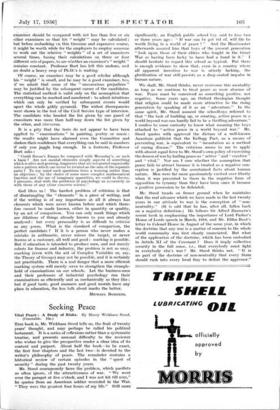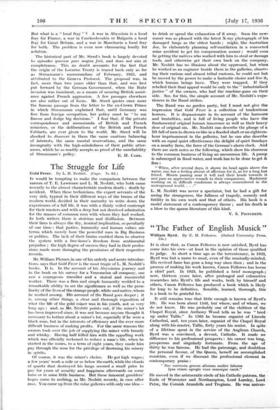Seeking Peace
Tms book is, Mr. Wickham Steed tells us, the fruit of twenty years' thought, and may perhaps be called his political testament. It is a series of reflexioris rather than a systematic tteatise, and presents unusual difficulty to the reviewer who wishes to give the prospective reader a clear idea of its content and purport. About half the book--to be exact; the first' four chapters and the last two‚ÄĒii devoted to the writer's philosophy of peace. The remainder contains a historical review - of certain episodes in the " quest of security" during the past twenty years.
Mr. Steed courageously faces the problem, which pacifists so often ignore, of the attractiveness of war. " We went over the parapet at five o'clock, and I was not hit till nine," he quotes from an American soldier wounded in the War. " They were the grmtest four hours of my life." Still more significantly, an English public school Loy said to him two or three years ago : " If war can be got rid of, will life be worth living in a world of peace ? " And the Headmaster afterwards assured him that boys of the present generation " look upon those of their elders who fought in the Great War as having been lucky to have had a hand in it." I should hesitate to regard this school as typical. But there is enough evidence to show that, even in a country where all apparent incentive to war is utterly lacking, the glorification of war still persists as a deep-seated impulse in human nature.
We shall, Mr. Steed thinks, never overcome this mentality as long as we continue to treat peace as mere absence of war. Peace must be conceived as something positive, not negative. Some years ago, an Oxford theologian thought that religion could be made more attractive to the rising generation by speaking of it as an adventure." In the same spirit, Mr. Steed assured the schoolboys referred to that " the task of building up, or creating, active peace in a world beyond war can hardly fail to be a thrilling adventure." I confess to some curiosity to know what meaning the boys attached to " active peace in a world beyond war." Mr. Steed quotes with approval the dictum of a well-known American publicist that the Kellogg Pact, as a means of preventing war, is equivalent to " incantation as a method of curing disease." The criticism seems to me to apply with almost equal force to Mr. Steed's own policy of exorcizing the demon of war by hailing peace as " active " and " creative " and " vital." Nor am I sure whether the assumption that peace fails to- attract because it is treated as a negative con- ception is justified by the ascertained facts about human nature. Men were far more passionately excited over liberty when it was presented to them in the negative form of opposition to tyranny than they have been since it became a positive possession to be defended.
Mr. Steed treads on firmer ground when he maintains that the real advance which we have made in the last twenty years in our attitude to war is the conception of " non- neutrality." (It is odd that he has, after all, fallen back on a negative definition.) He follows Sir Alfred Zimmem's recent book in emphasising the importance of Lord Parker's House of Lords speech in March, 1918, and Mr. Elihu Root's letter to Colonel House in August of the same year, in which the doctrine that any war is a matter of concern to the whole world community was first clearly enunciated. But what of the application of the doctrine, which has been embodied in Article XI of the Covenant ? Does it imply collective security in the full sense, i.e., that everybody must fight in everybody else's war ? Mr. Steed thinks not. " It is no part of the doctrine of non-neutrality that every State should rush into every local fray to defeat the aggressor."
But what is a " local fray " ? A war in Abyssinia is a local fray for France, a war in Czechoslovakia or Bulgaria a local Fray for Great Britain, and a war in Manchuria a local fray for both. The problem is even now clamouring loudly for solution.
The historical part of Mr. Steed's book is largely devoted to episodes quorum pars magna fait, and does not aim at completeness. This no doubt accounts for the fact that the origin of the Locarno Treaty is traced back only as far as Stresemann's memorandum of February, 1925, and attributed to the Geneva Protocol. The proposal was, in fact, more than two years older than that, and was first put forward by the German Government, when the Ruhr invasion was imminent, as a means of securing British assist- ance against French aggression. A few passages elsewhere are also rather out of focus. Mr. Steed quotes once more the famous passage from the letter to the ex-Crown Prince in which Stresemann explained that, until Germany was free from foreign occupation, her policy must be " to use Snesse and dodge big decisions." I fear that, if the private correspondence and memoranda of British and French Ministers, or the deliberations of the British and French Cabinets, are ever given to the world, Mr. Steed will be shocked to discover in them the same cautious balancing of interests, the same mental reservations, and the same incongruity with the high-mindedness of their public utter-. ances, which he so readily accepts as proof of the unreliability















































 Previous page
Previous page